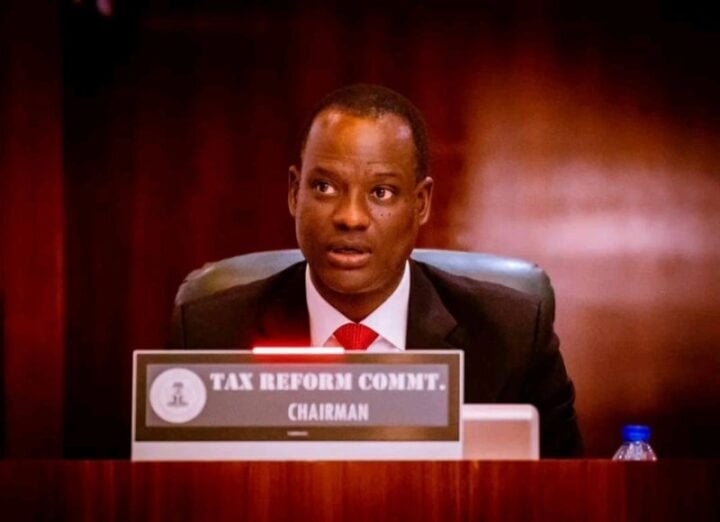The ongoing Value Added Tax (VAT) debate in Nigeria exposes deeper issues about governance, fiscal responsibility, and the structure of federalism. This debate isn’t just about revenue; it goes to the heart of how we understand and apply federal principles in the Nigerian context. The push for a derivation-based VAT system raises critical questions about constitutional integrity, equity, and the economic realities of interdependence among states.
Amidst this discourse, Mr. Taiwo Oyedele, Chairman of the Presidential Committee on Fiscal Policy and Tax Reforms, has added a layer of inconsistency and hypocrisy to the debate. While Oyedele acknowledges the importance of constitutional reforms, his stance on revenue-sharing mechanisms appears contradictory, prioritizing political expediency over sustainable federal principles.
Oyedele’s Hypocrisy and the Inconsistencies in the VAT Debate
Mr. Oyedele, in his capacity as a tax expert and reform advocate, has publicly emphasized the need for equity and fairness in tax administration. However, his position on VAT appears to undermine these principles. His advocacy for a derivation-based sharing formula, particularly benefitting economically advanced states, disregards the constitutional framework and federal values of redistribution.
Advertisement
1. Contradictions in Equity Arguments:
Oyedele often stresses the importance of supporting less-developed regions through equitable tax policies. Yet, his support for derivation in VAT allocation contradicts this stance, as it would disproportionately benefit wealthier states like Lagos and Rivers while marginalizing less-developed states that rely heavily on VAT allocations for public services and infrastructure.
2. Ignoring Interdependence:
Advertisement
VAT is a consumption tax that thrives on the interconnectedness of Nigeria’s economy. Wealthier states benefit significantly from goods and services supplied by less-developed regions. By advocating for derivation, Oyedele fails to acknowledge the contributions of these regions to the broader economic ecosystem.
3. Political Expediency Over Principles:
Oyedele’s position appears to align with powerful political interests rather than sound fiscal principles. This inconsistency weakens the integrity of his broader reform agenda and raises doubts about the credibility of the committee he leads.
At the Heart of the Debate: Federalism and Revenue Allocation
Advertisement
The VAT debate transcends Oyedele’s inconsistencies, touching on fundamental questions about Nigeria’s federal structure:
1. Current VAT Collection and Allocation
VAT is centrally administered by the Federal Inland Revenue Service (FIRS) and distributed as follows:
•15% to the Federal Government,
Advertisement
•50% to State Governments,
•35% to Local Governments.
Advertisement
Allocation to states is based on population, equality, and landmass—not derivation. This structure aligns with the revenue-sharing principles enshrined in the 1999 Constitution (as amended), ensuring redistribution to promote equitable development.
2. The Push for Derivation-Based Sharing
Advertisement
States like Lagos and Rivers argue for a derivation-based VAT model, claiming that states generating the most VAT should retain a higher share. However, this argument overlooks the unique nature of VAT as a consumption tax that reflects economic interdependence.
Extending the derivation principle to VAT would require a constitutional amendment. The principle currently applies only to resource revenues, such as oil, where 13% is allocated to resource-producing states. Attempting to apply it to VAT without constitutional reform undermines the legal framework of the federation.
Advertisement
3. Risks of a Derivation Model
Introducing derivation-based VAT sharing raises serious economic and equity concerns:
•Widening Inequalities: Wealthier states would benefit disproportionately, exacerbating regional disparities and leaving less-developed states unable to meet basic developmental needs.
•Undermining Interdependence: The interconnected nature of Nigeria’s economy means that VAT generated in one state often relies on contributions from others. A derivation model ignores this synergy.
•Threatening National Cohesion: A derivation-based model could deepen divisions among states, fostering resentment and undermining the unity of the federation.
The Way Forward: Constitutional Reform
The VAT debate highlights the need for a comprehensive review of Nigeria’s fiscal and constitutional framework. Key steps include:
1. Clarifying Revenue Allocation Principles:
The Constitution must explicitly define how VAT revenues should be allocated, balancing fiscal autonomy with redistribution.
2. Addressing Regional Disparities:
Fiscal reforms should prioritize reducing inequalities, ensuring that all states, regardless of their economic capacity, have access to resources for development.
3. Strengthening Federalism:
The debate underscores the importance of cooperative federalism, where states recognize their interdependence and work towards shared goals.
Conclusion: Building a Fair and Sustainable Federal System
The VAT debate is not merely about tax revenue; it is a question of how we interpret and apply federal principles within our governance framework. Changes to revenue-sharing mechanisms like VAT must emerge from a broader constitutional review that reflects the realities of Nigeria’s federal structure. Anything short of this risks undermining the legal and institutional foundation of the federation.
Mr. Oyedele’s position exemplifies the dangers of politicizing critical fiscal debates. For Nigeria to move forward, leaders must prioritize principles over expediency, ensuring that fiscal policies promote equity, sustainability, and national cohesion. The proper course of action is constitutional reform—not short-sighted adjustments—that uphold the integrity of our federal system and ensure equitable development for all regions.
Views expressed by contributors are strictly personal and not of TheCable.
Add a comment












